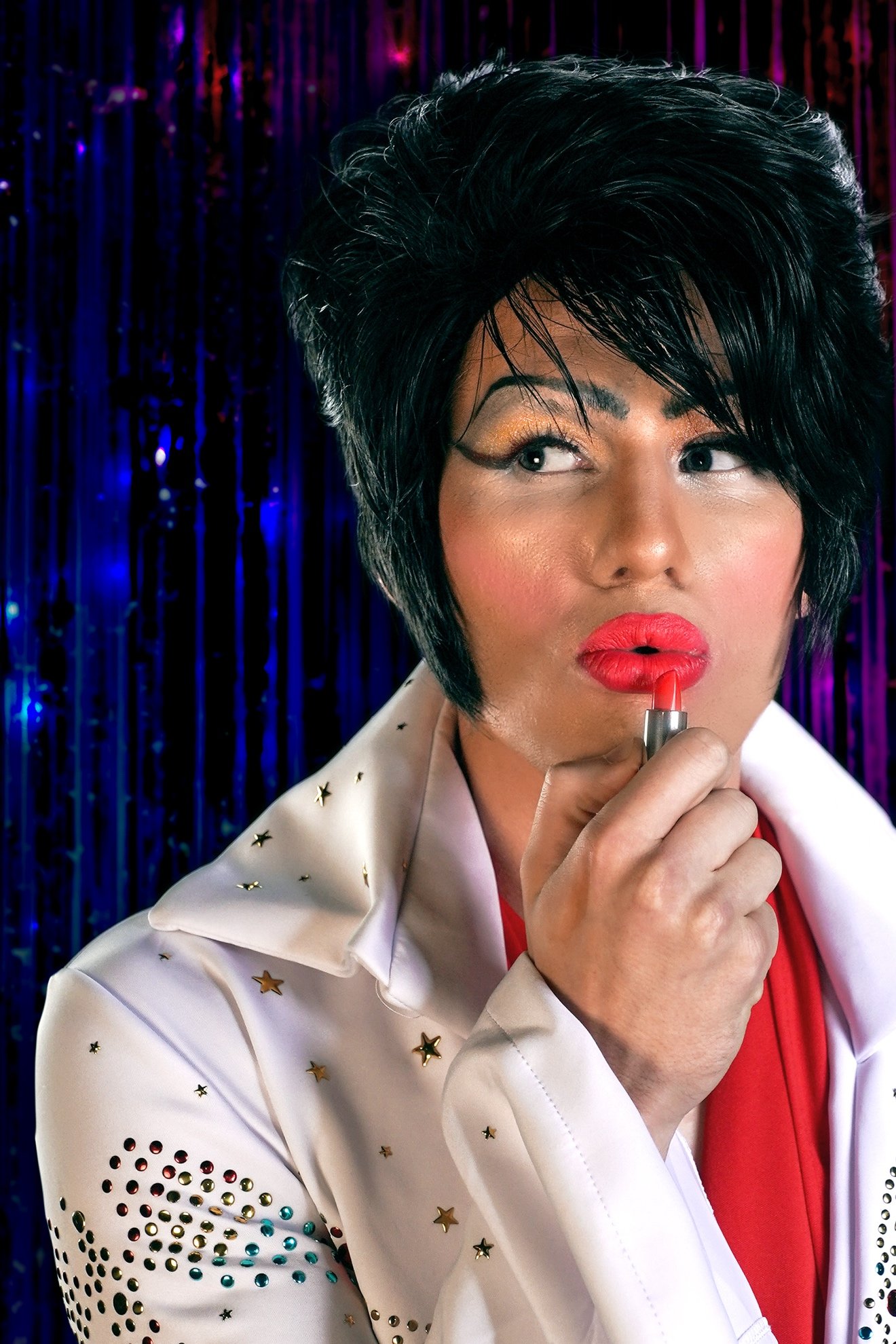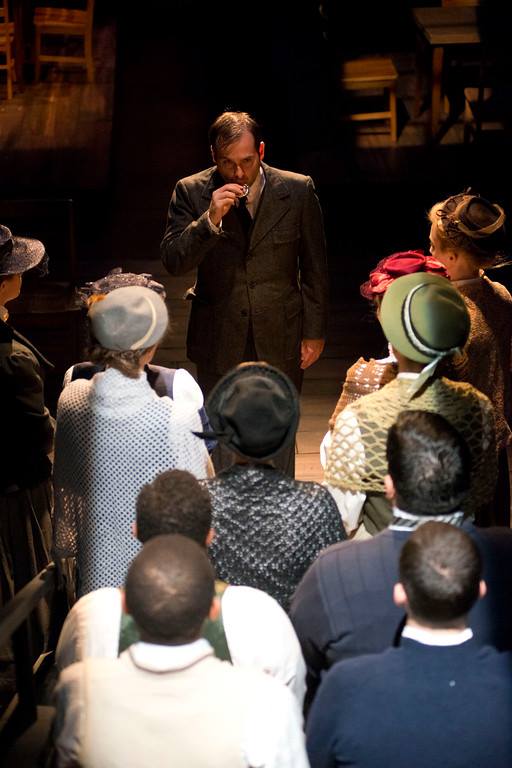A Raisin in the Sun is the story of the Youngers, a Black family, living in poverty in the South Side of Chicago in the 1950s. It is the story of the “American Dream,” and the true ability, and the cost, of achieving that dream. Lena (Jocelyn Sanders), her son, Walter Lee, Jr. (De’On Turner) and his wife Ruth (Aaliyah Broadwater), her daughter Beneatha (Fiona Schreier), and Walter Lee and Ruth’s son Travis (Dorian Mitchell) live together in the same run-down apartment Lena and Walter Lee Sr. moved into right after their wedding. There is a shared bath down the hallway.
The Senior Mr. Younger has recently died, and the family is waiting on the arrival of a life insurance check for $10,000.00. A life-changing sum. Each family member has a different dream for the money – Mama and Ruth dream of owning a home, Walter Lee wants to purchase a liquor store in order to become a successful businessman, and Beneatha dreams of going to medical school.
Walter Lee is employed as a chauffeur, and chafes at the restrictions imposed on him by his color and his demeaning position. He sees purchasing a liquor store as the way out and up. Lena, a God-fearing, church-going woman, is utterly opposed to both the sale and consumption of alcohol; it becomes very clear very early that the insurance money will never be used to achieve Walter Lee’s dream. Lena and Ruth, each domestic workers, yearn to move out of the dingy apartment and into a “real” home. The small determined potted plant in the kitchen window represents Lena’s wish for a garden of her own. College student Beneatha is trying to fight the stereotypes of Black women, the oppression of the Black community, and is questioning the religious beliefs with which she has been instilled from birth. Travis is an adorable ten-year old kid being spoiled into oblivion by his doting and over-indulgent grandmother. But wait! There’s more! Ruth is pregnant. Yes. Conflict and confrontation abound.
Lena finally has had enough of the bickering. She leaves the house and, on her return, advises the family that she has purchased a home. In Clybourne Park. A very white neighborhood. (Why buy a house in a white neighborhood? Because it was less expensive than a home in a Black neighborhood.)
“I do not use the term tour de force lightly… It is the only phrase I can use to describe De’ On Turner’s performance”
I do not use the term tour de force lightly. Or even ever. It is the only phrase I can use to describe De’ On Turner’s performance as Walter Lee Jr. His frustration of being a young, intelligent, able-bodied, poverty-stricken Black man is inextricably intertwined with his frustration with trying to achieve his dreams of success. The coiled-up energy inside is barely/rarely concealed. Turner paces the stage with the fluidity of a cat, and is by turns loving, seductive, impish, frustrated, angry, and desperate. He is explosive and, at times, both frightening and frightened. I have seen Mr. Turner onstage a number of times; he improves exponentially with each role.
Jocelyn Sanders is a gift to the stage, and it’s been too long since she’s been on one. Her many directorial outings are well-received, but it is a joy to watch her create one of the theatre’s most enduring characters. Her Lena is loving and tired and frustrated and hopeful. Her musings on her late husband are so vivid that he becomes an unseen yet very present member of the cast. Her heartbreak over the loss of her Walter Lee Sr. is palpable; the family’s chance at achieving the aforementioned “American Dream” exists at the cost of the life of the family patriarch.
Sanders and Turner together is a masterclass. To watch two consummate actors play off each other is mesmerizing. I truly found myself on the edge of my seat. Columbia has always had a bountiful supply of amazing actors; this is your chance to watch two of the best in action.
“Jocelyn Sanders is a gift to the stage”
Aaliyah Broadwater was able to hold my attention simply by walking across stage. Her love for her husband and her family is ever present, as is her utter exhaustion – both physical and emotional. Fiona Schreier is a fierce Beneatha! On fire to change the world, refusing to marry her current wealth suitor, and learning and understanding more about her heritage from an African exchange student. (Sometimes you also want to smack her for being so self-centered, but … such is youth.)
Michaelmikkel Wright and John Ballard play George Murchison and Joseph Asagai, respectively. Beneatha’s beaus, they provide two entirely different points of view of the Black experience. The son from a wealthy family, George is good looking, shallow, and conceited. He takes no pride his African heritage and has no interest at all in Beneatha’s intellect. (Fortunately, he is only the proverbial “passing fancy.”) Joseph is the absolute opposite. A student from Nigeria, he takes great pride in his lineage and hopes to go back and make a difference in his village.
Mylea Pressley was an absolute hoot as the nosy neighbor, Mrs. Johnson. She barges into the Younger’s apartment, makes herself at home, and proceeds to advise them of the mistake they are making in moving to an all-white neighborhood. She “just happens” to have a newspaper article about the bombing of a home in that neighborhood. She will not be surprised if she sees the Youngers meet the same fate. Her commentary might be seen as jealousy, but it represents the fear of some people to make a change, especially a difficult one. Mrs. Johnson seems quite content with the status quo and doesn’t understand the need to change anything, particularly if it might be dangerous. Pressley’s timing is excellent. Her program bio states this is her first role in a straight play. I hope isn’t her last.
Rowland Marshall is Bobo, one of Walter Lee’s boon companions. He comes to Walter Lee to give him the bad news that the two of them have been had, and both of them have lost all of their money. Marshall’s stance and delivery was exactly that of someone who (along with WL) has made a truly idiotic decision and has to confess the failure. You really hope Bobo’s wife is kind when he tells her the news. Olan Domer plays Karl Lindner, the sole white character. Lindner represents the Clybourne Park “welcome committee.” He is exactly as you would expect him to be and Domer portrays him as smarmily as he is.
There was some “hesitation” from some of the characters early on, but as the play progressed each actor became less halting and more confident, and the lines flowed more smoothly. This was the cast’s first night in front of an audience. It does take a moment to find the rhythm of a show when you add audience responses.
The set, the sound, the costumes were all beautifully executed. (I love a working sink onstage!) However… having something real to drink in those coffee cups would be excellent. I understand not having any liquid in the beer bottles, but please give the coffee drinkers something to sip.
Lorraine Hansberry’s A Raisin in the Sun debuted on Broadway in 1959, when she was a mere babe of 29. It was the first play written by a Black woman to be produced on Broadway, the first Broadway play with a Black director (Lloyd Richards), and, with the exception of one character, the first Broadway play with a Black cast. In 1959. It took nearly two years to come up with funding to produce the play which went on to win 4 Tony awards, the New York Drama Critics’ Circle “Best Play” of 1959, and a Pulitzer prize.
Ms. Hansberry was born into a politically active family; her father established one of the first Black savings banks in Chicago and was a successful real estate businessman. Mr. Hansberry did purchase a home in a white neighborhood, having won the right to do so after he challenged a Supreme Court decision against integration.
Many thanks to Ron Himes for bringing this classic piece to life. Raisin addresses issues which were prevalent in the 1950s and which still exist today, albeit in a more insidious fashion.
Stephanie Milling, Chair of the Department of Theatre and Dance, PROMISED that the seats in Longstreet will be re-upholstered. From her lips to (insert the name of your chosen deity’s) ears.
A Raisin in the Sun runs through Friday, March 1st at Longstreet Theatre. Three acts with one intermission. Trust me, it does not feel like three acts. Parking is always at a premium around the University, so leave home early to get a space. This weekend there is also a show (“She Loves Me”) at Drayton Hall, a performance by the SC Philharmonic at the Koger Center, and there are women’s and men’s basketball games scheduled. Good luck with that.
















